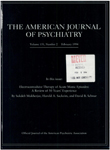Crack/cocaine abusers in the general hospital: assessment and initiation of care
Abstract
OBJECTIVE: Cocaine, either smoked (as "crack") or taken intranasally, is now a common cause of psychiatric illness. This study was designed to assess the impact of cocaine abuse on a general psychiatric service and an obstetrics service in an urban general hospital and to evaluate a program for engaging affected patients in addiction treatment. METHOD: The charts of 300 general psychiatric patients (not admitted for addiction treatment) and 60 cocaine-abusing prenatal or postpartum patients were reviewed. A treatment referral program based on professionally directed peer leadership was established for patients with cocaine abuse. Results of evaluation and referral of 100 other cocaine-abusing psychiatric patients and the 60 prenatal or postpartum patients were then determined. RESULTS: Fully 64% (N = 191) of the 300 psychiatric patients were diagnosed as substance abusers; 38% (N = 113) of them abused cocaine. Almost one-third of these cocaine abusers had no axis I diagnosis other than substance abuse/dependence, and the majority were homeless. Urine samples were positive for cocaine in a majority of the obstetric patients studied. A majority of the psychiatric patients who were referred through the peer-led program enrolled in outpatient cocaine treatment--three times as many as in the chart review group. Most of the obstetric patients suitable for referral enrolled for treatment as well. CONCLUSIONS: Cocaine abuse may be responsible for a large portion of psychiatric admissions in urban public general hospitals. Cocaine abusers in psychiatric and obstetrics services are apparently responsive to a peer-oriented mode of referral into treatment.
Access content
To read the fulltext, please use one of the options below to sign in or purchase access.- Personal login
- Institutional Login
- Sign in via OpenAthens
- Register for access
-
Please login/register if you wish to pair your device and check access availability.
Not a subscriber?
PsychiatryOnline subscription options offer access to the DSM-5 library, books, journals, CME, and patient resources. This all-in-one virtual library provides psychiatrists and mental health professionals with key resources for diagnosis, treatment, research, and professional development.
Need more help? PsychiatryOnline Customer Service may be reached by emailing [email protected] or by calling 800-368-5777 (in the U.S.) or 703-907-7322 (outside the U.S.).



